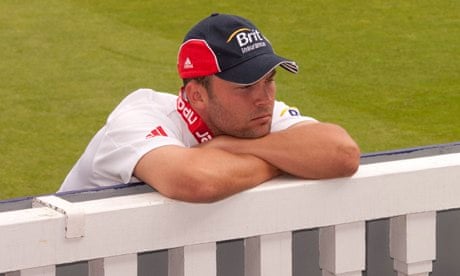First, Marcus Trescothick, sleepless and in India, shuddered out of an England tour, an England profession. Then Mike Yardy, a global Twenty20 winner, unexpectedly laid low. Numerous beyond and present England internationals – an entire slip cordon – observed the…
First, Marcus Trescothick, sleepless and in India, shuddered out of an England tour, an England profession. Then Mike Yardy, a global Twenty20 winner, unexpectedly laid low. Numerous beyond and present England internationals – an entire slip cordon – observed the match. The motives they cite are diverse: pressure, homesickness, even “going cuckoo.” however, the cease-all term that physicians prefer is more acquainted: melancholy.

Now Jonathan Trott, for 4 years the embodiment of the self-absorbed sporting hardman, has followed fit, leaving Australia on Monday after one test of the Ashes series. “Trotty has been suffering from a stress-associated circumstance for quite a while,” stated his instruct, Andy Flower. “I don’t feel it’s far-right that I’m gambling knowing that I’m now not one hundred% and that I cannot currently perform at the level I’ve carried out inside the beyond,” stated Trott himself. We can not recognize his indisposition’s exact nature; his unexpected departure shows a critical setback.
It also raises a broader question. Does cricket have trouble? Is there something about the sport, the combination of good fortune, bloody-mindedness, unpredictability, and caprice that may force someone over the edge? Or is it the opposite manner round: that the sort of folks who make it to this game’s pinnacle is the sort of extreme, driven individuals whose very self-obsession makes them more susceptible to intellectual infection?
A survey in advance this yr carried out by the benevolent fund of the expert Cricketers Association (PCA) asked 500 cricketers present and past a variety of questions on intellectual and bodily health. It determined five% of those surveyed had sought help for intellectual fitness issues. The worldwide discern is more or less equivalent: depression is a situation that affects approximately five% of the world’s population, consistent with the world fitness enterprise. This is 350 million humans.
Trescothick is not certain cricket is something unique – though he has, in reality, noticed that on account that he came smooth, different gamers will come asking him for a recommendation. “I have spoken to people along the way,” he stated in a recent interview. “some people asking a few questions, a person would possibly name on behalf of someone else to discover about it. a few human beings need to talk, say, ‘i have struggled with this or that.’ I just have a tendency to concentrate. I cannot recommend it on a medical level. Some of its miles just like my own story. It is a hassle of strain. Anybody has their personal pressure and anxiety that they live their existence by. Simply due to the fact I play cricket would not suggest saying I am more susceptible. it is not distinctive from some other walk of existence.”
Graeme Fowler isn’t so sure. “I went from making a double hundred for England to being within the Lancashire seconds four months later,” says Fowler. “There were big America and downs.”
All sports have their USA and downs of the route, and cricket isn’t by myself in generating sports activities stars with depression. Ian Thorpe, Robert Enke, Frank Bruno, John Kirwan, Ronnie O’Sullivan, Neil Lennon. Like me, Fowler reveals himself thinking, “whether cricket attracts a positive type of character, or cricket makes you a positive sort of man or woman.” it is often stated that cricket is a game performed inside the head. But how plenty of the health regimes, the net practice, the tactical and strategic preparations are involved with what a participant is thinking about?
“We do hundreds of bodily training, but how a good deal of it issues the mind?” asks Fowler. “very little.” And this from a person who isn’t always just a fellow melancholy sufferer but a educate of young talent. “even though we comprehend it’s all about temperament, the way you deal with pressure, we do very little about it.” There are plenty of theories – and medical disagreements – as to the purpose of melancholy, lots of them too clinical to say here. After four years of considering the challenge, I have rationalized it for this reason: it’s a situation that feeds on pressure. As soon as upon a time, we were creatures that replied to existential threats offered via a predator with unexpected bursts of adrenalin, the flight-or-fight reflex. Nowadays, the stressors have changed beyond all recognition (there aren’t any saber-toothed tigers anymore), but the responses have not. We have 21st-century sensibilities strolling on a neanderthal software program. The adrenalin pumps regularly and frequently, whether in mortal danger or just coming out to bat at various nine for Malden Wanderers 1/3 XI. it’s an overwrought machine. The psychiatrist Tim Cantopher as soon as instructed me, changed into setting 18 volts via a 13-amp device. It will sooner or later blow.
Is not batting “seeking to do the undoable”? You stand 22 yards away from a bowler, armed with a 4in-wide piece of wood, and try to hit a 5oz piece of cork and leather touring at ninety miles per hour. Again and again. No balls are equal. Your livelihood rests on the outcome. And right here’s the perverse bit: to achieve success, most of the time, you may not need to hit the ball at all. Occasionally you might have to wait hours, days even, to bat. And you then may simply get the one terrifying delivery of the match that leaves you with 0 whilst every person else has crammed their boots. So that subsequent time you go out there, that notion of failure is in no way to some distance faraway from the again of your mind.
Or what about bowling? You have to hurl a ball, with a direct arm, please, and from an an alternative genuine position, 22 yards, making it land inside the equal region each time, with enough guile, tempo, or different sleight of hand to avoid the detrimental impulses of the batsman. You need to try this time and again and once more. Now and then, while you do it properly, you’ll get little reward. And from time to time, whilst you do it badly, you may get fortunate. Simply know not often enough to make a profession out of it.
RELATED ARTICLES :
- TV giants are lining up for a fight over a $10 TV bundle without sports.
- The best performances at the Cricket World Cups of the 1980s
- How Trump’s word ban should affect your fitness care
- The Death of Loyalty in Sports
- The Joy of Watching Sports Alone
Jason Ratcliffe, the assistant leader executive of the PCA, admits there’s something of the perverse in the sport. “all of us come into the game as enthusiastic, excited younger people,” says Ratcliffe, who skilled a brief brush with depression after he retired.
“But cricket is by its nature – the wicket, the situations, the unique people you play towards – so many matters are from your manage. The middle of the game is stoic batting, watch your off stump, depart the ball. It is identical with bowling, line and duration, line and length. when you stand again and think about what you are doing day in time out, every so often it’s bloody monotonous.”
Iain O’Brien consents. The brand new Zealander, who performed 22 checks between 2004 and 2009, has in view that spread out about the bouts of depression that have accompanied him on and stale the pitch. He says cricket dressing rooms are full of players with extraordinary intellectual tics. “I have played with guys with all styles of mental contamination,” he says, recognizing OCD tendencies in a few and selfishness bordering on Asperger‘s in others. Perhaps most illuminating of all is that he says many gamers will generally tend to stay no longer on successes but on failure. It’s miles this kind of poor, unhelpful thinking that can fuel depressive episodes.
“I had an awesome chat with [Australian test player] Ed Cowan,” O’Brien says. “He phrased it well, stated we spend more time considering our subsequent inevitable failure than our next achievement. that’s the psyche of cricketers.”
He agrees with Fowler that cricket is a mental game, and not enough to put together gamers. “It takes robust people to get through this,” says O’Brien, who has written a kid’s e-book with references to each cricket and melancholy, Pirates do not Play-Cricket. “it is a mental game, and it charges you mental power, and it’s that mental strength that I don’t assume we educate sufficiently. We come to be in a hollow, and we are so head tiredly.”
And then you retire. What’s it like while you’re out for the closing time, again inside the dressing room, finally, definitively, flush up against the beginning of the rest of your lifestyles? not every player can exit like Muttiah Muralitharan, taking his 800th wicket with his very last ball in check cricket, or Nasser Hussain, hitting the prevailing runs to visit a very last century at Lord’s. The PCA knows some ex-cricketers absolutely conflict with lifestyles beyond the boundary. Ratcliffe says one in three gamers will war with the post-career transition; the PCA’s survey found that of those lately retired, a substantial minority – 24% – said they were less than satisfied disillusioned with their publish playing career. “I actually hadn’t observed whatever to update cricket as a love as a passion as an activity,” says the former Essex bowler Darren Cousins in one of the numerous videos the PCA has organized to help players negotiate the psychological perils and pitfalls of a professional profession.
Popular
-

Tamping Down Speculation of Cable Mobile M&A Plays
The cable giants announced a percent Monday under which they…
2478 0 -

How to govern youngsters’ display screen time on Android
While Android smartphones and drugs may be excellent ways to…
3430 0 -

The fine gadgets to offer a university student
If you’re purchasing a present for a college pupil over…
1844 0 -

-

Yes, those free health apps are sharing your data with other companies
The word “in case you’re not paying, My Live Updates…
2367 0
Latest News
It is the most important point to keep your machines in the best condition. When bringing your equipment back into…





















